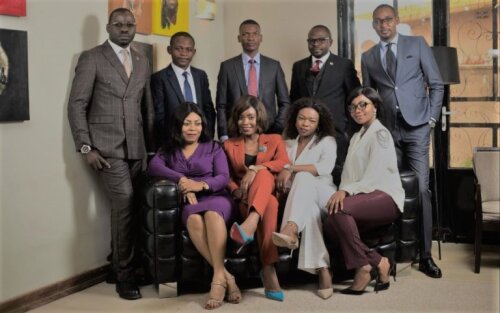Best Energy Regulatory Law Lawyers in Lubumbashi
Share your needs with us, get contacted by law firms.
Free. Takes 2 min.
List of the best lawyers in Lubumbashi, DR Congo
About Energy Regulatory Law in Lubumbashi, DR Congo
Energy Regulatory Law in Lubumbashi, DR Congo, refers to the set of legal frameworks and regulations that govern the production, transmission, distribution, and consumption of energy resources such as electricity, oil, and natural gas. The city of Lubumbashi, being an industrial and mining hub, operates within the broader legislative structure set by the Congolese government but also faces unique challenges and local regulations relevant to its specific energy demands. Key aspects of this law include licensing, tariff setting, environmental compliance, and consumer protection.
Why You May Need a Lawyer
Navigating Energy Regulatory Law in Lubumbashi can be complex due to rapidly evolving policies, the involvement of various governmental bodies, and the technical nature of energy projects. Individuals, businesses, and organizations may require legal assistance in a variety of situations, including:
- Starting or expanding an energy-related business and needing proper licensing or permits
- Dealing with disputes over electricity or fuel supply contracts
- Resolving regulatory compliance issues with local or national authorities
- Facing investigations or sanctions for alleged regulatory violations
- Negotiating tariffs or access to the power grid
- Understanding your rights as an energy consumer or producer
- Applying for incentives or subsidies for renewable energy projects
- Addressing issues related to environmental standards and community impact
A qualified lawyer can help ensure compliance, protect your interests, and represent you in conflicts or negotiations involving local energy regulators and other parties.
Local Laws Overview
Energy regulation in Lubumbashi operates primarily under the national framework established by the Democratic Republic of the Congo, particularly the Electricity Law No. 14/011 of June 17, 2014, but certain local regulations also apply. Key components include:
- Licensing and Authorization: All energy activities typically require authorization from the relevant regulatory authority, with specific requirements depending on the type and scale of the activity.
- Regulatory Authority: The Autorité de Régulation de l’Électricité (ARE) is the primary agency responsible for oversight, licensing, tariff approval, and ensuring fair competition in the sector.
- Tariff Setting: Tariffs for electricity and other energy are regulated, and companies must seek approval for price adjustments.
- Foreign Investment: Foreign entities must comply with additional requirements related to investment, ownership, and technology transfer.
- Environmental Compliance: Projects must meet environmental assessment standards and obtain necessary permits to operate.
- Dispute Resolution: The law provides for administrative appeals and, in some cases, judicial review for regulatory decisions affecting stakeholders.
Local authorities in Lubumbashi may also have additional requirements related to zoning, environmental impact, and community relations, especially for large-scale projects.
Frequently Asked Questions
What is the main regulatory authority for energy in Lubumbashi?
The Autorité de Régulation de l’Électricité (ARE) is the main authority overseeing electricity regulation, licensing, and industry compliance in Lubumbashi and across DR Congo.
Do I need a license to produce or distribute electricity in Lubumbashi?
Yes, both individuals and companies must obtain a license from the ARE to produce, transmit, or distribute electricity legally.
How are electricity tariffs set in Lubumbashi?
Electricity tariffs are regulated. Providers must submit applications to the ARE for approval of any proposed changes to tariffs.
Are there incentives for renewable energy projects?
Yes, there are laws and policies that provide incentives for renewable energy, such as tax breaks or expedited licensing, especially for solar and hydroelectric projects.
What should I do if I have a dispute with my energy provider?
You can file a complaint with the energy provider first. If unresolved, you may escalate the issue to the ARE or pursue legal action with the help of an energy law specialist.
Can foreign companies invest in the Lubumbashi energy sector?
Yes, but foreign companies must comply with investment, licensing, and operational requirements set by DR Congo law and may face additional local conditions in Lubumbashi.
Is environmental compliance mandatory for energy projects?
Yes, all energy projects must undergo environmental assessment and obtain necessary permits to ensure compliance with local and national environmental laws.
What happens if I operate without a proper license?
Operating without a license can result in significant fines, closure of your business, or even criminal proceedings. It is essential to obtain all proper authorizations before starting operations.
How long does it take to obtain an energy license?
The timeframe depends on the type and scale of the project. It can range from a few months for standard applications to a year or more for large or novel projects that require extensive review.
Do energy consumers have legal protections in Lubumbashi?
Yes, consumers have rights regarding fair access to energy, dispute resolution, and protection against unfair practices. These rights are enforced by both the ARE and the judicial system.
Additional Resources
If you are seeking more information or need official guidance regarding Energy Regulatory Law in Lubumbashi, consider contacting the following organizations:
- Autorité de Régulation de l’Électricité (ARE) - the national energy regulator
- Ministry of Hydraulic Resources and Electricity - responsible for policy and planning
- Lubumbashi City Council - for local permits and compliance requirements
- Environmental Protection Agency - for environmental assessment and compliance
- Chamber of Commerce and Industry of Lubumbashi - for support and networking in the energy sector
- Local law firms with energy regulation specialists
Next Steps
If you require legal assistance in Energy Regulatory Law in Lubumbashi, start by identifying the exact nature of your legal need, such as licensing, compliance, or dispute resolution. Collect all relevant documents and information regarding your situation. Next, seek out a qualified lawyer or law firm with expertise in energy regulation and experience navigating the Lubumbashi regulatory environment. Consult with the lawyer to get a proper evaluation of your case, understand your rights and obligations, and outline possible solutions. Acting promptly and seeking professional advice early in the process is often key to achieving the best outcome for your energy-related legal matters.
Lawzana helps you find the best lawyers and law firms in Lubumbashi through a curated and pre-screened list of qualified legal professionals. Our platform offers rankings and detailed profiles of attorneys and law firms, allowing you to compare based on practice areas, including Energy Regulatory Law, experience, and client feedback.
Each profile includes a description of the firm's areas of practice, client reviews, team members and partners, year of establishment, spoken languages, office locations, contact information, social media presence, and any published articles or resources. Most firms on our platform speak English and are experienced in both local and international legal matters.
Get a quote from top-rated law firms in Lubumbashi, DR Congo — quickly, securely, and without unnecessary hassle.
Disclaimer:
The information provided on this page is for general informational purposes only and does not constitute legal advice. While we strive to ensure the accuracy and relevance of the content, legal information may change over time, and interpretations of the law can vary. You should always consult with a qualified legal professional for advice specific to your situation.
We disclaim all liability for actions taken or not taken based on the content of this page. If you believe any information is incorrect or outdated, please contact us, and we will review and update it where appropriate.











